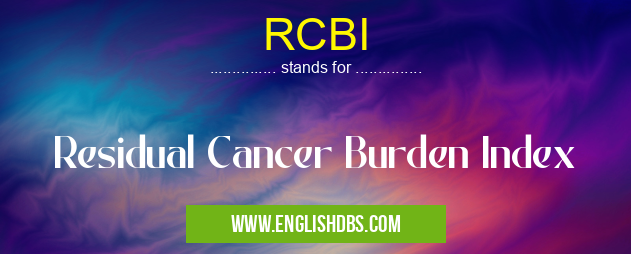What does RCBI mean in CANCER
RCBI, or Residual Cancer Burden Index, is a term used in the medical field to measure the amount of cancer that remains in the body following treatment for a patient with cancer. It is most commonly used to assess how successful a particular type of cancer treatment has been. The RCBI measures the residual burden of cancer by looking at different factors, such as tumor size, number and location of tumors, and lymph node involvement. The goal of measuring the RCBI is to give health care providers a better understanding of how much cancer remains after various treatments have taken place. By understanding this information, providers can better tailor treatments for their patients in order to achieve maximum efficacy and reduce the chance of cancer recurring or worsening

RCBI meaning in Cancer in Medical
RCBI mostly used in an acronym Cancer in Category Medical that means Residual Cancer Burden Index
Shorthand: RCBI,
Full Form: Residual Cancer Burden Index
For more information of "Residual Cancer Burden Index", see the section below.
Essential Questions and Answers on Residual Cancer Burden Index in "MEDICAL»CANCER"
What is the Residual Cancer Burden Index (RCBI)?
The RCBI is a comprehensive tool used to measure and quantify residual cancer risk in both people who have had a cancer diagnosis and those without a history of cancer. It measures a range of factors that are associated with the likelihood of developing cancer, such as lifestyle choices, environmental exposures, and genetics. The RCBI can be used to identify populations at high risk for developing cancer so that appropriate interventions or preventive services can be implemented.
How does the RCBI work?
The RCBI collects data on various factors associated with an individual’s current and future risk of developing cancer. This includes information about lifestyle, environmental factors, family history, genetic testing results, and other pertinent information usually collected by healthcare providers during patient visits. All of this data is then compiled into one report providing an overall score that reflects an individual’s estimated long-term risk for developing certain cancers.
Who performs the RCBI assessment?
Trained medical professionals use the RCBI to assess individuals for their potential future risk of developing cancer. Typically this would be done by a physician or health care provider during regular health check-ups or visits where additional assessment is required.
What is taken into account when performing a RCBI assessment?
The individual’s personal medical history along with any relevant family histories are taken into account when assessing the individual’s future risk for certain types of cancers using the RCBI. In addition, lifestyle choices such as diet, exercise habits, smoking status and alcohol consumption are also taken into consideration along with any exposures to toxic substances or radiation in order to get an accurate representation of their individual risk profile for various cancers.
Are there any particular cancers that are more accurately assessed using the RCBI?
Yes, some specific types of cancers may be better assessed using the RCBI than others due to factors such as hereditary genetic mutations which can increase an individual’s risk for certain types of cancers over time. Cancers such as prostate cancer, breast cancer and colorectal cancers are among those that are most accurately measured using the RCBI.
Are there any risks associated with taking part in an RCBI assessment?
No, there are no known risks associated with participating in an RCBI assessment. All information collected during these assessments remain confidential between patient and healthcare provider only.
Is there any cost associated with undergoing an RCBI assessment?
Generally speaking no costs are associated with having an RCBI assessment completed as it typically falls under routine preventative healthcare services provided by many insurance providers.
How often should people undergo an RCBI assessment?
Generally speaking it is recommended that individuals undergoing screening receive annual assessments via their primary care physicians depending on their unique health histories and personal risk profiles.
Can anyone receive an RCBI Assessment?
Yes anyone can receive an assessment through their primary care provider if they have concerns about their future cancer risks overall.
